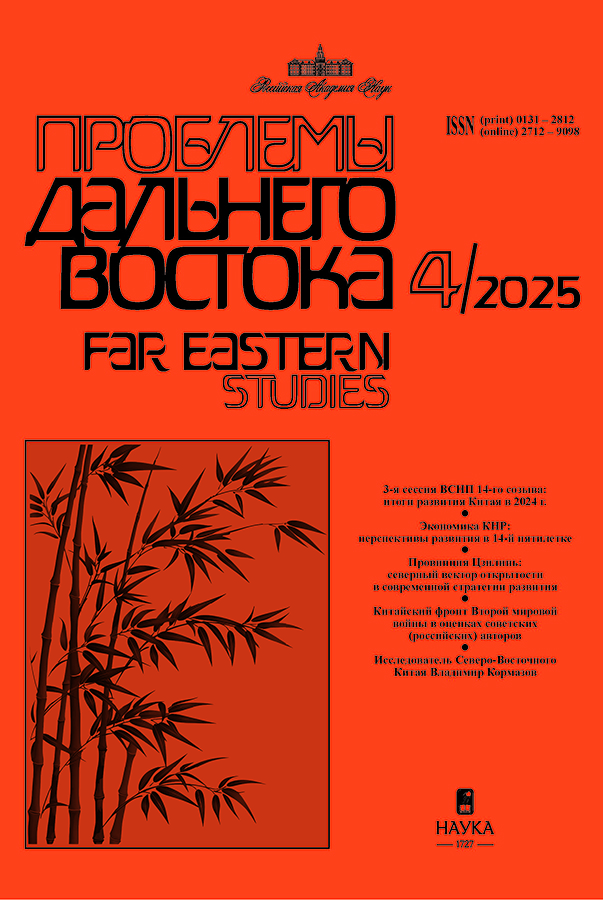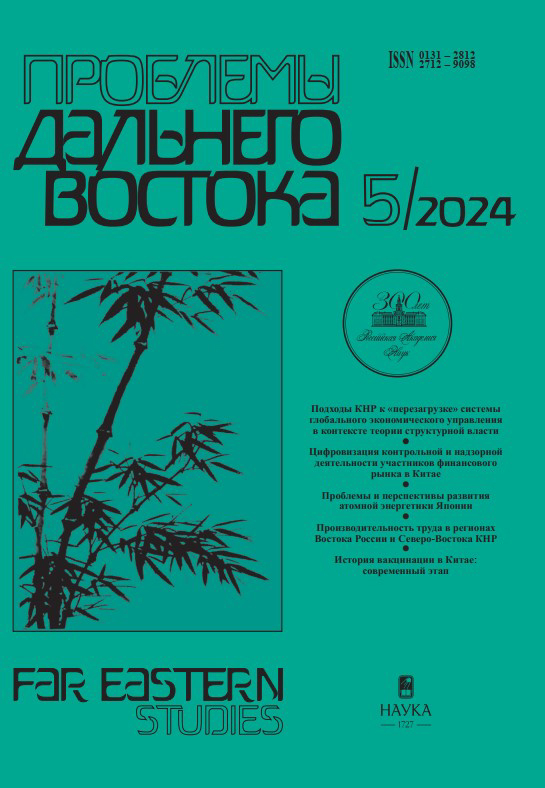The Ideological Factor of Internet Governance in China: Features and Tools in the Context of Confrontation with the United States
- Authors: Yankova A.D1, Trenin D.V1
-
Affiliations:
- HSE University
- Issue: No 5 (2024)
- Pages: 25-38
- Section: Politics
- URL: https://clinpractice.ru/0131-2812/article/view/676246
- DOI: https://doi.org/10.31857/S0131281224050026
- ID: 676246
Cite item
Abstract
The Internet turned into an arena of ideological struggle. It benefits those who have control over data flows and opinion market. In the information space, previously insurmountable barriers are easily bypassed, the number of generators of “narratives” is increasing exponentially. Strategic success achieved in the information field can have a significance comparable to political or military success. An example is the confrontation between key players in cyberspace — the US and China. Their statehood is based on ideology — left-wing liberalism, transhumanism and americano-centric globalism on the one hand, innovative Marxism and socialism with Chinese characteristics on the other. Despite differences in fundamental values, political and social systems, Washington and Beijing actively use Internet tools to seek support, expand governance and propaganda. The winners in the ideological struggle are not yet clear. But certain dynamics can be fixed. The US has to admit that its belief in the ubiquity of liberal democracy and the “technological optimism” of the early 21st century have not been justified. The Internet has failed to change China – China has changed the Internet for itself. The political and ideological conditions of the PRC and the efforts of the CPC have formed unique parameters for the development of network. The party managed to create a system of distributed control over the Internet, users and content, allowing leadership to manage the situation on the “battlefield”. The US and its allies in the fight against “autocrats and authoritarians” are increasingly slipping into the fight against dissent in their own countries. During this struggle the West is becoming more intolerant and authoritarian.
About the authors
A. D Yankova
HSE University
Author for correspondence.
Email: ayankova@hse.ru
ORCID iD: 0000-0002-7209-9818
Junior Researcher, Centre for Comprehensive European and International Studies
Moscow, 119017, Russian FederationD. V Trenin
HSE University
Email: dtrenin@hse.ru
ORCID iD: 0000-0002-9343-956X
Research Professor, Faculty of World Economy and International Affairs
Moscow, 119017, Russian FederationReferences
- Afonina L.А., Vinogradov A.V. Sistema obshchestvennogo doveriya v KNR [Social credit system in China]. Far Eastern Studies. 2023. No. 3. S. 125–142. doi: 10.31857/S013128120026254–0. (In Russ.)
- Kashin V. B. Krasnyj kapitalizm: zachem samyj bogatyj kitaec vstupil v kompartiyu [Red Capitalism: why did the richest Chinese join the Communist Party]. Forbes. 28.11.2018. URL: https://www.forbes.ru/obshchestvo/369701-krasnyy-kapitalizm-zachem-samyy-bogatyy-kitaecvstupil-v-kompartiyu (accessed: 05.06.2024). (In Russ.)
- Gorbunova S.A. Novyye religioznyye dvizheniya. Falungun [New religious movements. Falun Gong]. The History of China from Ancient Times to the Beginning of the 21st Century. Vol. 9: Reforms and Modernization (1976–2009). Ed. by A.V. Vinogradov. M.: Nauka, 2016. S. 528–533. (In Russ.)
- Chen Bing-Ming. Digital Leninism: The Complex, Dangerous Relationship Between Tech Giants and the Chinese Communist Party // CIPE. January 15, 2021. URL: https://www.cipe.org/resources/digital-leninism-the-complex-dangerous-relationship-between-tech-giants-and-the-chinese-communist-party/ (дата обращения: 05.06.2024).
- Creemers R. Cyber-Leninism: The Political Culture of the Chinese Internet. In: Price M, Stremlau N, eds. Speech and Society in Turbulent Times: Freedom of Expression in Comparative Perspective. Cambridge University Press, 2017. Pp. 255-273.
- Minzner C., Wang Y. Rise of the Chinese security state // China Quarterly. 2015. Vol. 222. No. 1. Pp. 339-359. doi: 10.1017/S0305741015000430
- Sokolshchik L.M. Year One of the Biden Administration: U.S. Foreign Policy Towards Russia // Journal of Eurasian Studies. 2024. Vol. 15. No. 1. Pp. 70-80. doi: 10.1177/18793665231170639
- The Problems of Internet Privacy and Big Tech Companies // The Science Survey. February 28, 2023. URL: https://thesciencesurvey.com/news/2023/02/28/the-problems-of-internet-privacy-and-big-tech-companies/ (дата обращения: 30.05.2024).
- 年大国博弈背景下网络空间态势观察 [Monitoring the situation on the Internet in the context of the game of the great Powers in 2023]. 中国信息安全. 07.03.2024. URL: https://www.secrss.com/articles/64235 (accessed: 30.08.2024). (In Chin.)
- 中国共产党党内统计公报 [Internal Party Statistical Bulletin of the CPC]. 新华网. 30.06.2023. URL: http://www.news.cn/2023–06/30/c_1129725145.htm (accessed: 11.06.2024). (In Chin.)
- 中国共产党党员网络行为规定 [Regulations on Online Behavior of Members of the Communist Party of China]. 政府信息公开. 20.02.2024. URL: https://www.baiyinqu.gov.cn/XZJDBMDW/bmdw/byqyjglj/fdzdgknr/lzyj/zcfg/art/2024/art_53c837cfa7ac4e439d7d92847670bcc0.html (accessed: 11.06.2024). (In Chin.)
- 网传习近平8•19讲话全文 [Online-version of Xi Jinping’s speech on 19th of August]. China Digital Times. 2013. URL: https://chinadigitaltimes.net/ chinese/ 321001.html (accessed: 28.08.2024).
- 习近平在十八届中共中央政治局第一次集体学习时讲话 [Xi Jinping spoke during the first group study of the 18th Politburo of the Communist Party of China]. 中国政府网. 19.11.2012. URL: https://www.gov.cn/ldhd/2012–11/19/content_2269332.htm (accessed: 05.06.2024). (In Chin.)
- 互联网时代如何巩固党在意识形态领域主导权 [How to consolidate the Party’s dominance in the ideological field in the Internet era]. 人民日报. 29.06.2016. URL: http://www.rmlt.com.cn/2016/0629/430634.shtml (accessed: 05.06.2024). (In Chin.)
- 关于当前意识形态领域情况的通报 [Communique on the current state of the ideological sphere]. China Digital Times. 2013. URL: https://hackmd.io/@billy3321/HyaKhNwrO (accessed: 01.09.2024). (In Chin.)
- 加强党对网信工作的全面领导 [Strengthen the Party’s overall leadership of net letter work]. 党建网. 15.01.2024. URL: http://www.dangjian.com/shouye/sixianglilun/dangjianpinglun/202401/t20240115_6726828.shtml (accessed: 05.06.2024). (In Chin.)
- 坚决打赢网络意识形态斗争——学习习近平总书记相关重要论述 [Resolutely win the ideological Struggle on the Internet — Learning Important Discourses related to General Secretary Xi Jinping]. 平顶山市发展和改革委员会. 10.06.2022. URL: http://fgw.pds.gov.cn/contents/22290/497167.html (accessed: 30.05.2024). (In Chin.)
- 杨峰: 中国共产党领导的互联网治理: 历程, 成就与经验 [Yang Feng. Internet Governance under the Leadership of the Communist Party of China: History, Achievements and Experience]. 治理期刊. 2022年. 第1期. 第1–9页. (In Chin.)
- 胡翼鹏: 论毛泽东的社会学思想与社会学自主知识体系建构 [Hu Yipeng. On Mao Zedong’s Sociological Thought and the Construction of Sociological Independent Knowledge System]. 江海学术期刊. 2024年. 第1期. 第8–9页. (In Chin.)
- 董盛林, 贺亚维, 袁海霞: 毛泽东的调查研究思想及其当代价值论析 [Dong Shenglin, He Yawei, Yuan Haixia. Mao Zedong’s Research Thought and Analysis of Contemporary Values]. 中共石家庄市委党校学报. 2024 年. 第1期. 第1–23页. (In Chin.)
- 高举中国特色社会主义伟大旗帜为全面建设社会主义现代化国家而团结奋斗 [Holding high the great banner of socialism with Chinese characteristics and striving for unity in building a modern socialist country in an all-round way]. 新华网. 25.10.2022. URL: http://www.news.cn/politics/cpc20/2022–10/25/c_1129079429.htm (accessed: 05.06.2024). (In Chin.)
Supplementary files











